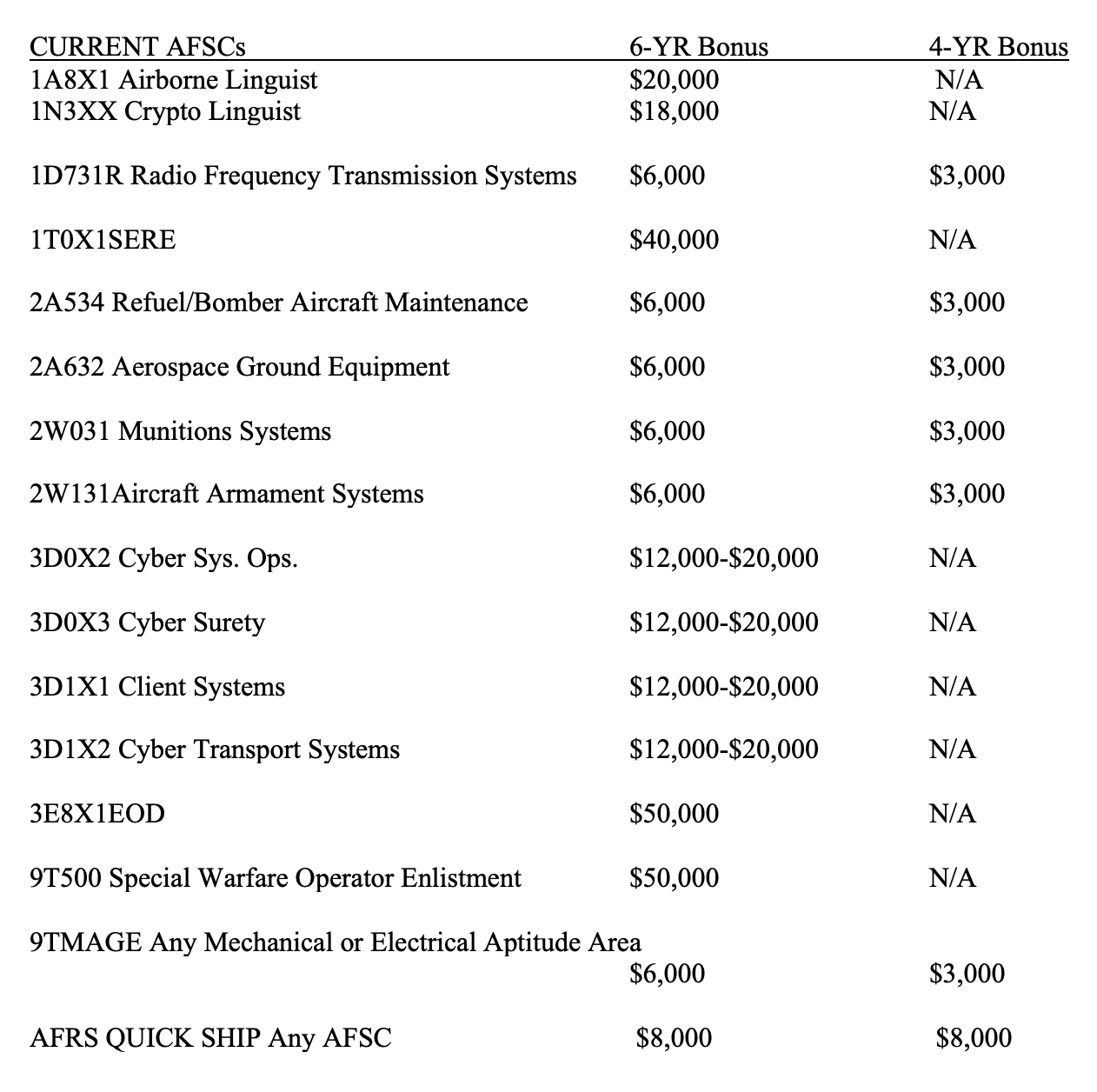In the mid-1980s, the United States Marine Corps began its iconic “We’re Looking for a Few Good Men” ad campaign, while the United States Navy has long attempted to entice recruits with the slogan, “See the World! Save Your Money! Serve Your Country!” Today, the services still employ marketing campaigns to connect with potential service members – and last year the U.S. Army launched its “The Calling” series of short animated videos created specifically for YouTube.
However, the old tried and true method of recruitment is still being employed – namely offering money. Even today, those joining the British military are often (unofficially) described as “taking the Queen’s shilling,” but the practice of enlistment incentives is one that has become increasingly universal.
This month, the United States Air Force announced that it would add more opportunities for future airmen to receive bonuses upon entering active duty in fiscal year 2022 (FY22). The service also added that six skills were added to the FY22 Initial Enlistment Bonus program on April 11, 2022 for four or six-year contracts in hard-to-fill job specialties and an additional incentive called “Quick Ship” will be offered until Sept. 30, 2022.
“As we roll up our sleeves in the battle for talent, we’ve got to remain competitive as we go after our next generation of Airmen,” said Maj. Gen. Ed Thomas, Air Force Recruiting Service commander. “While we’ve got an unmatched value proposition we also have a record-high level of competition for America’s best and brightest.”
Quick Ship Incentives
The Air Force’s announcement to offer quick ship incentives follows a similar program that was launched by the U.S. Army in February.
“Recruiting in the current environment is a challenge, and we have positions we need to fill right now,” said Maj. Gen. Kevin Vereen, who leads the U.S. Army Recruiting Command, at the time of the Army’s announcement. “Our Army is counting on us to fill these training vacancies quickly, so we are able to offer incentives to gain interest in critical career fields.”
Quick ship is when an already fully-qualified applicant fills a short-notice Basic Military Training Vacancy, shipping out within a set time. For the Army, the shipping bonuses were broken into 30-, 60- and 90-day timeframes. The quicker an applicant could depart, the higher the bonus.
For the U.S. Air Force, the timeline was even shorter, as it called for recruits to be ready to depart in five days or less. Any member who enters the active duty Air Force within any career field in a quick-ship status could be eligible to receive an $8,000 bonus. In addition, some cyber career fields have bonus pay amounts that are based on the member’s highest level of certification, giving the applicant an opportunity to receive up to $20,000.
Special Warfare recruits are already eligible for up to $50,000 upon entering active duty with the Air Force.
These recruiting incentives provide military recruiters the additional support and tools to use as they press through all the challenges associated with reaching the Air Force’s FY22 Total Force accessions goals. Among the challenges that recruiters face include a low youth propensity to join, a national labor shortage and aggregate effects of operating primarily virtual since the March 2020 outbreak of Covid-19.
Career Opportunities
The Army had announced in February that the current careers up for the shipping bonus included combat-related professions such as infantry and combat engineers, as well as support specialties like truck drivers and mechanics.
The Air Force provided a list of bonuses that recruits can expect to receive:
In addition to the quick ship bonuses, recruits can still receive other standard military benefits that often include housing allowances, health coverage, college tuition, and family support services.
“These potential recruits are the lifeblood of combat readiness and national security,” said Maj. Gen. Thomas. “So we must do everything we can to inspire, engage and recruit the Airmen.”




